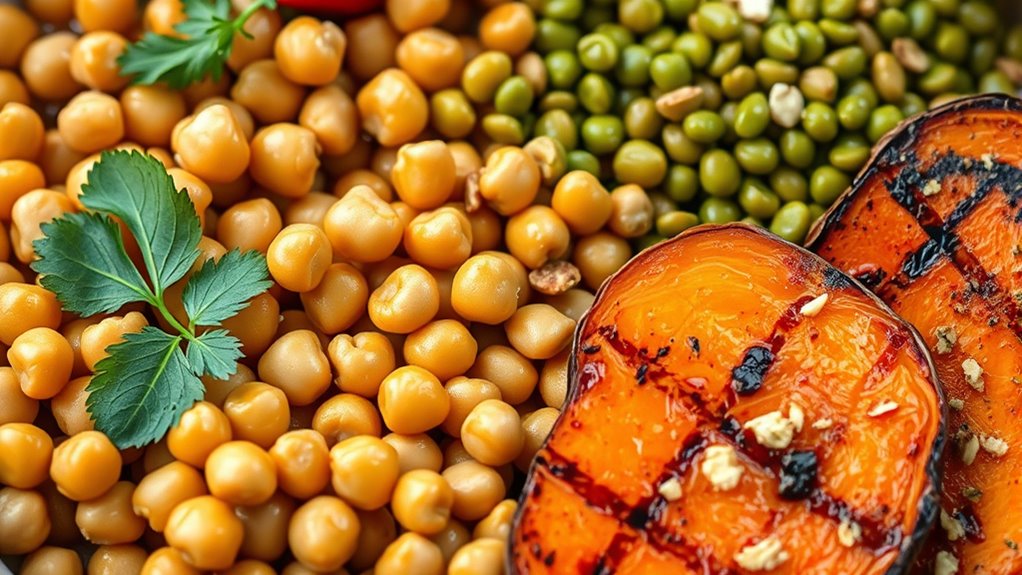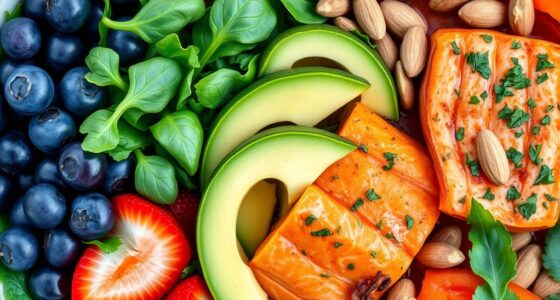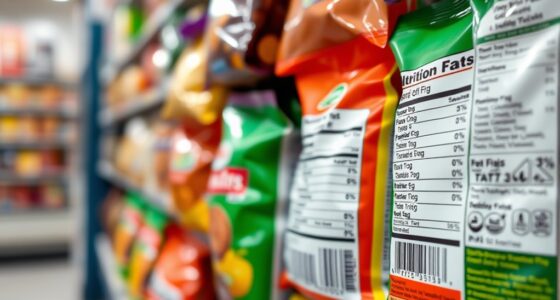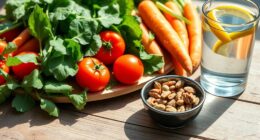To pack a punch with vegetarian protein, focus on foods like lentils, chickpeas, black beans, and soy products such as tofu, tempeh, and edamame. Nuts and seeds like almonds, peanuts, hemp, and chia are also excellent sources that add healthy fats along with protein. Combining these foods in your meals can boost your intake and make certain you get a variety of essential nutrients. Keep exploring for more tasty, nutrient-dense options to power your diet.
Key Takeaways
- Legumes like lentils, chickpeas, and black beans are high in protein, fiber, and versatile for various dishes.
- Soy-based products such as tofu, tempeh, and edamame offer dense protein sources suitable for many recipes.
- Nuts and seeds, including almonds, peanuts, hemp, and chia, provide protein along with healthy fats and nutrients.
- Combining different plant proteins ensures a complete amino acid profile and balanced nutrition.
- Incorporate these foods into meals and snacks to efficiently meet vegetarian protein needs.

Are you looking to boost your protein intake without eating meat? If so, you’re in luck because there are plenty of vegetarian sources that pack a punch. Plant-based protein trends have surged in recent years, driven by health, environmental concerns, and ethical choices. These trends highlight the importance of incorporating diverse plant proteins into your diet, and understanding the nutritional comparisons of vegetarian sources can help you make smarter choices.
Legumes, such as lentils, chickpeas, and black beans, are among the most popular plant-based protein sources. They deliver substantial amounts of protein per serving, along with fiber, vitamins, and minerals. For example, cooked lentils provide about 18 grams of protein per cup, making them an excellent meat alternative in stews and salads. Similarly, chickpeas offer roughly 15 grams of protein per cup and can be used in hummus, curries, or roasted as snacks. When comparing these sources nutritionally, legumes stand out for their high protein content, low fat, and fiber, which aids digestion and keeps you feeling full longer.
Legumes like lentils and chickpeas are rich in protein, fiber, and essential nutrients.
Another powerful vegetarian protein source is soy. Tofu, tempeh, and edamame are all derived from soybeans and are versatile in cooking. Tofu is particularly popular because it absorbs flavors well and can be incorporated into a variety of dishes. It contains around 10 grams of protein per half-cup serving. Tempeh, fermented soy, offers even more protein—about 15 grams per half-cup—and has a firm texture that works well in stir-fries and sandwiches. Edamame, young soybeans, provide about 17 grams of protein per cup when cooked. Nutritional comparisons of vegetarian sources show that soy-based products often have a higher protein density compared to other plant options, making them a favorite for those seeking meatless protein.
Nuts and seeds also contribute considerably to vegetarian protein intake. Almonds, peanuts, chia seeds, and hemp seeds are rich in protein, healthy fats, and micronutrients. For instance, a quarter-cup of hemp seeds contains roughly 9 grams of protein, and chia seeds provide about 5 grams per two-tablespoon serving. Although nuts and seeds are calorie-dense, they make excellent additions to meals or snacks, supporting both protein needs and overall nutrition. Incorporating these sources into your diet can also provide important amino acids, which are essential for muscle repair and overall health.
Incorporating a variety of these vegetarian sources ensures you get a broad spectrum of amino acids, especially when combining different plant proteins. The key is balancing your intake based on your nutritional needs and preferences. With the increasing popularity of plant-based diets, understanding nutritional comparisons of vegetarian sources helps you optimize your meals for protein, health, and sustainability. So, explore these options, experiment with recipes, and enjoy the benefits of plant-based proteins that are both delicious and nutritious.
Frequently Asked Questions
Are Vegetarian Proteins Complete Proteins?
You might wonder if vegetarian proteins are complete. Most plant-based amino acids aren’t complete on their own, but you can attain complete protein intake through vegetarian protein pairing. By combining foods like beans with rice or hummus with whole wheat bread, you ensure you get all essential amino acids. So, yes, with mindful choices, you can enjoy complete vegetarian proteins that meet your dietary needs effectively.
How Much Vegetarian Protein Should I Consume Daily?
Think of your daily protein needs as a well-balanced symphony, with each note playing a vital role. You should aim for about 46 grams for women and 56 grams for men, adjusting based on activity level and meal timing. Incorporate vegetarian protein sources steadily throughout the day, and consider protein supplements if you’re struggling to meet your goals. Consistency is key to fueling your body’s harmony.
Can Vegetarian Sources Meet All My Protein Needs?
You can definitely meet all your protein needs with vegetarian sources. By including a variety of plant-based amino acids, such as beans, lentils, tofu, and quinoa, you guarantee you’re getting complete proteins. Vegetarian meal planning helps you combine these foods effectively throughout the day, maximizing nutrient intake. So, with thoughtful choices, you can easily achieve your daily protein goals without relying on animal products.
Are There Any Side Effects of High Vegetarian Protein Intake?
Imagine your body as a finely tuned engine; too much of one fuel can cause issues. Eating high vegetarian protein might lead to kidney stress or protein deficiency if unbalanced. While plant-based proteins are generally safe, overdoing it could strain your kidneys over time. Stay mindful, diversify your sources, and guarantee your intake aligns with your health needs to avoid potential side effects.
Which Vegetarian Proteins Are Best for Athletes?
You’re wondering which vegetarian proteins are best for athletes. Focus on plant-based amino acids, as they’re essential for muscle repair and energy. Opt for high-quality vegetarian protein sources like quinoa, lentils, chickpeas, and soy products, which offer excellent vegetarian protein quality. Incorporate a variety of these foods into your diet to guarantee you get all necessary amino acids, supporting your athletic performance and recovery effectively.
Conclusion
Now that you’ve uncovered these vibrant vegetarian protein sources, you hold the keys to fueling your body like a well-oiled machine. Think of these foods as the brushstrokes in your masterpiece—each one adding strength, color, and depth. Embrace their power and let them weave a tapestry of energy within you. With every bite, you’re cultivating a garden of resilience, turning everyday meals into a symphony of nourishment that echoes through your life.









